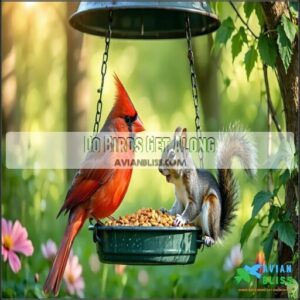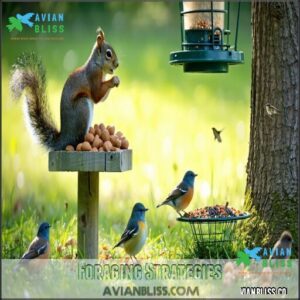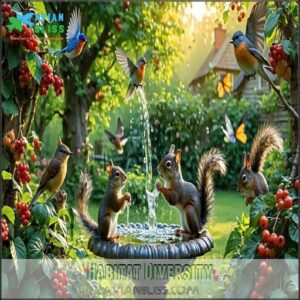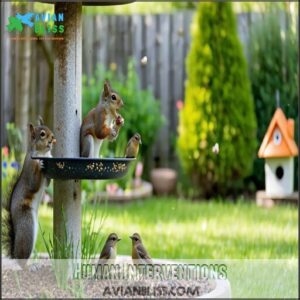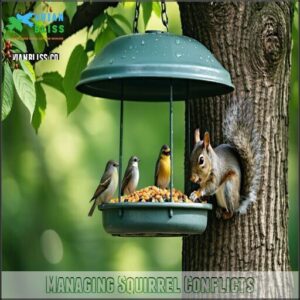This site is supported by our readers. We may earn a commission, at no cost to you, if you purchase through links.
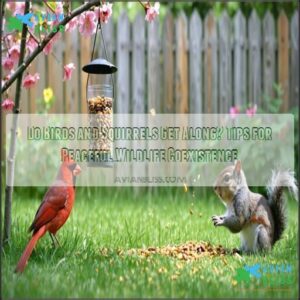
You’ll often notice these backyard neighbors engaged in competitive rather than cooperative relationships. Squirrels frequently chase birds away from feeders, while birds occasionally mob squirrels they perceive as threats to nests or food sources.
This tension stems from overlapping ecological niches—both creatures compete for similar resources like nuts, seeds, and nesting locations. Their relationship resembles neighbors with a fence dispute rather than friendly companions.
However, their interactions vary based on species, habitat conditions, and resource availability. Understanding these natural dynamics can help you create a backyard environment where both creatures thrive with minimal conflict, considering their competitive relationships and the need for similar resources.
Table Of Contents
- Key Takeaways
- Bird Squirrel Relationship
- Do Birds Get Along
- Bird Squirrel Interactions
- Factors Affecting Coexistence
- Managing Squirrel Conflicts
- Promoting Harmonious Coexistence
- Frequently Asked Questions (FAQs)
- Do birds and squirrels get along well?
- How do squirrels and birds interact?
- Do birds & squirrels share the same habitat?
- How can squirrels and birds coexist?
- Do squirrels have tight ecological relationships with birds?
- Do squirrels eat birds?
- Do squirrels interact with birds?
- Are squirrels aggressive towards birds?
- What bird scares away squirrels?
- Do squirrels scare away birds?
- Conclusion
Key Takeaways
- Birds and squirrels typically have competitive relationships rather than friendly ones, as they compete for similar resources like seeds, nuts, and nesting locations in their overlapping ecological niches.
- You’ll notice that food availability significantly impacts their interactions—when resources are abundant, especially in urban settings, competition decreases and coexistence becomes more peaceful.
- You can promote harmonious coexistence by using squirrel-proof feeders, installing baffles, selecting seeds that birds love but squirrels avoid (like safflower and nyjer), and creating separate feeding stations.
- Both creatures can actually benefit from each other’s presence through their "neighborhood watch" system—they eavesdrop on each other’s alarm calls to detect predators faster, creating an interspecies communication network that improves survival chances for both.
Bird Squirrel Relationship
Birds and squirrels share overlapping habitats and food sources, which naturally leads to occasional competition and interaction.
Nature’s neighbors dance in branches and feeders, sharing space with reluctant camaraderie.
By understanding their behaviors and environmental needs, you can help foster a balanced coexistence in your backyard or local ecosystem.
Habitat Overlap
Birds and squirrels often share environments like trees or shrubs, but overlapping habitats can spark wildlife interactions.
Urban coexistence tends to smooth things over with abundant resources, while dense woodlands amplify competition.
Nesting competition is common, especially for tree cavities, but resource partitioning helps, highlighting nature’s balancing act amid habitat overlaps, which demonstrates the creatures’ ability to coexist, with abundant resources.
Resource Competition
Feeder dominance highlights how squirrels often outmaneuver birds at feeders, grabbing seeds first.
Nesting scarcity adds tension, as tree cavities become hot real estate.
With dietary overlap, both compete for nuts and fruits, leading to clever foraging tactics.
Urban competition intensifies bird squirrel interactions, especially when food’s limited.
Watching squirrels raid feeders can feel like witnessing a cheeky, furry heist, which showcases the intensifies bird squirrel interactions.
Environmental Influences
Weather shifts and habitat fragmentation shape how birds and squirrels coexist in urban or rural habitats.
Climate change, pollution impacts, and invasive species disrupt habitat dynamics, leading to resource scarcity. In your backyard environment, tree loss or dense urban habitats increase competition.
Rising temperatures further exacerbate these challenges for bird populations.
Supporting native plants can ease tensions, creating balanced spaces for both birds and squirrels to thrive harmoniously, which is crucial for maintaining healthy ecosystems.
Do Birds Get Along
In the context of bird socialization, some species get along like old friends, while others squabble like siblings over the last cookie.
Birds rely on avian communication—chirps, calls, and body language—to establish flock dynamics and maintain order. They often form species hierarchies, with dominant birds claiming prime perches or food spots.
Here’s how they interact:
- Cooperative Breeding: Some species, like crows, team up to raise young, showing remarkable teamwork.
- Territorial Displays: Cardinals and blue jays defend their turf with bold colors and loud calls.
- Mixed Flocks: Smaller birds, like finches, often flock together for safety.
While birds generally coexist peacefully, competition for resources, especially in shared habitats with squirrels, can spark occasional drama. Birds also use songs for territorial defense. It’s nature’s version of a neighborhood dispute!
Bird Squirrel Interactions
You’ll notice birds and squirrels don’t always see eye to eye, especially when food or nesting sites are involved.
Their interactions often blend cooperation and competition, revealing unique adaptations and shared survival strategies.
Territorial Behaviors
When sharing spaces, territoriality often sparks aggressive interactions.
Squirrels chasing birds is common, using dominance displays like vocalization and scent marking. Birds defend feeding grounds through physical confrontations, especially during nesting seasons.
At bird feeders, competition gets intense, with squirrels tipping feeders while birds flee or regroup.
| Behavior | Squirrels | Birds |
|---|---|---|
| Vocalization | Chattering sounds | Chirps and warning calls |
| Defense Strategy | Scent marking, chasing | Flocking, pecking, mobbing |
| Interaction Style | Persistent and physical | Fleeing, regrouping, alert |
Foraging Strategies
As territories overlap, foraging behavior reflects resource competition.
Squirrels display caching behavior, especially storing nuts for winter, while birds adapt diets seasonally.
Urban foraging intensifies bird feeder competition due to abundant but shared food.
Successful coexistence hinges on strategies like:
- Using squirrel-proof feeders.
- Offering squirrel-specific food stations.
- Scatter-feeding seeds for ground-dwelling birds.
- Managing spilled seeds to reduce disputes, which is crucial for successful coexistence.
Predator Alert Systems
Listening closely to danger signals, birds and squirrels eavesdrop on each other’s alarm call interpretations to spot predators faster.
Nature’s early warning system: birds and squirrels listen to each other’s alarm calls, creating an interspecies neighborhood watch.
This shared threat response creates a unique interspecies communication network.
While birds rely on high-pitched "seet" calls, squirrels use squeaks, enhancing vigilance behavior.
These interactions, though instinctive, show how nature’s teamwork benefits survival, turning predator risks into mutual eavesdropping benefits.
Birds use different alarm calls to convey specific threats.
Factors Affecting Coexistence
You’ll find that food availability, habitat diversity, and human interventions all play key roles in shaping how birds and squirrels interact.
By understanding these factors, you can better manage their coexistence and even reduce some of the squabbles over shared spaces.
Food Availability
Birds and squirrels aren’t always best friends at feeders, especially when food competition intensifies.
Food availability shifts seasonally, influencing their behavior.
Try these to manage conflicts:
- Offer safflower seeds—birds love them, squirrels don’t.
- Use weight-sensitive bird feeders to prevent squirrel access.
- Regularly clean spills to minimize scavenging.
- Store food securely to avoid raiders.
Habitat Diversity
A mix of habitats works wonders for coexistence. Urban habitats often create more interactions, while rural habitats and complex forest composition reduce competition.
Diverse ecosystems with shrubs, trees, and ground cover maintain natural balance.
| Habitat Type | Impact on Birds | Impact on Squirrels | Overall Outcome |
|---|---|---|---|
| Urban Habitats | Increased foraging | Increased food raiding | Higher competition |
| Rural Habitats | Balanced resources | Reduced conflict | Peaceful coexistence |
| Forest Composition | Safe nesting zones | Ample climbing space | Harmony |
| Complex Backyards | Diverse food sources | Shared environment | Friendly interactions |
The table highlights the impact of different habitats on birds and squirrels, demonstrating how diverse ecosystems can lead to harmony and friendly interactions.
Human Interventions
If you’re tweaking your garden, human interventions like feeder modifications and squirrelproofing make a big impact.
Tilt feeders or add baffles to keep squirrels guessing. Offering supplemental food or squirrel deterrents like chili-treated seeds can reduce tension.
Ethical considerations matter—avoid harming squirrels. Habitat creation, like designing diverse spaces, supports peaceful coexistence.
Relocation effects are tricky, often disrupting squirrel and bird communities, which is why ethical considerations are crucial.
Managing Squirrel Conflicts
You can manage squirrel conflicts by using practical strategies to protect bird feeders and shared habitats.
Simple tools like baffles, squirrel-resistant feeders, and thoughtful seed choices can keep the peace while ensuring both species find what they need, utilizing practical strategies.
Squirrel Proof Feeders
A squirrelproof bird feeder saves you from the drama of birdseed bandits.
Strategic feeder placement, like avoiding trees or fences, makes it harder for squirrels to leap. Add clever deterrents like tilting feeders or well-placed baffles.
Experiment with seed choices squirrels dislike, such as safflower.
Consider using effective feeder options to completely eliminate squirrels’ access to the birdseed.
Ethical DIY solutions, like cayenne-coated seeds, keep both birds and squirrels coexisting happily, utilizing effective feeder options.
Garden Design Strategies
Thoughtful garden design can encourage peaceful coexistence.
Use natural landscaping with diverse plant selection, like native shrubs and perennials, creating a wildlifefriendly garden design.
Arrange space for separate bird-friendly gardens and squirrel-friendly zones. Add water features for hydration and rocks for shelter creation.
Consider wildlife garden products to enhance your design. This garden wildlife management approach balances space arrangement, giving each species room to thrive without constant competition.
Seed Selection
When choosing seeds, aim for options birds love but squirrels avoid.
Nyjer and safflower seeds work well, as squirrels dislike their taste.
Seed blends designed for birds provide better nutritional value.
Smaller seeds help minimize competition, as squirrels prefer larger ones.
Considering squirrel-resistant bird feeders can further deter them from accessing the seeds.
Adding cayenne pepper can inhibit squirrels without harming birds, ensuring peaceful interactions and promoting coexistence at your feeders.
Baffle Installation
Ready to outsmart those clever squirrels? Add baffles to your bird feeder pole! These obstacles stop squirrels from climbing up while birds feed peacefully.
You can find the perfect baffle for your needs.
- Choose sturdy baffle types like dome or cone shapes, designed for squirrel deterrents.
- Install baffles at least 4 feet from the ground—height matters!
- Use durable materials like metal for better wear.
Promoting Harmonious Coexistence
You can encourage birds and squirrels to coexist peacefully by understanding their behaviors and creating a balanced habitat.
By providing separate food sources and shelter options, you’ll help reduce competition and promote harmony in your backyard.
Conservation Efforts
Supporting conservation efforts can help preserve wildlife populations and maintain balance in shared ecosystems.
Focus on habitat preservation through planting native vegetation and promoting ecosystem restoration.
Public awareness campaigns educate communities about sustainable practices and the importance of species monitoring.
Managing wildlife populations responsibly guarantees coexistence while protecting biodiversity, allowing birds and squirrels to thrive without stepping on each other’s toes—literally, ensuring ecosystem balance.
Native Species Protection
Protecting native species helps preserve local ecosystems and maintain balanced habitats.
Focus on using conservation strategies like planting native flora, which supports wildlife naturally adapted to the area.
Keep an eye on invasive species—they can disrupt the ecosystem faster than you’d think.
By prioritizing habitat preservation, you’ll contribute to a healthier, thriving ecosystem where species coexist harmoniously, and this is crucial for maintaining balanced habitats and supporting native species.
Backyard Habitat Creation
Creating a wildlife-friendly backyard means blending habitat diversity with comfort.
Plant native plants for natural food, add water sources for hydration, and build shelter options like shrubs or hollow logs.
Place separate feeding stations and bird feeders to reduce squirrel-bird conflicts.
A well-designed garden balances needs, offering both birds and squirrels plenty of space to thrive without stepping on each other’s tails.
Consider how native plants attract insects to further enrich the habitat.
Mutualistic Relationship Enhancement
Encouraging mutualistic relationships between birds and squirrels enhances backyard coexistence.
Focus on cooperation and shared resources.
Consider these tips:
- Birds’ calls can signal food or predators, fostering interspecies communication.
- Squirrels’ seed dispersal benefits plant growth, aiding ecosystem stability.
- Shared food resources promote indirect benefits for both species.
- Encourage cooperative behaviors with diverse feeding spots.
- Observe backyard interactions to understand their resource sharing dynamics.
Frequently Asked Questions (FAQs)
Do birds and squirrels get along well?
Birds and squirrels typically coexist with occasional conflicts.
They’ll compete for food at feeders and nesting sites, but you’ll often see them sharing habitats.
Their relationship varies based on resource availability and specific circumstances, which can lead to conflicts.
How do squirrels and birds interact?
In the great theater of nature, squirrels and birds often engage in complex interactions.
You’ll notice they compete for food sources and nesting spots, while occasionally benefiting each other through alarm calls and seed dispersal.
Do birds & squirrels share the same habitat?
Yes, birds and squirrels frequently share overlapping habitats in trees, shrubs, and grasslands.
You’ll often find them competing for the same resources like seeds, nuts, and fruits, especially in urban parks and wooded areas.
How can squirrels and birds coexist?
You can create coexistence by providing separate feeding stations, squirrel-proof bird feeders, and diverse habitats with multiple food sources.
Squirrels and birds naturally partition resources when given space and sufficient food options, which allows for coexistence.
Do squirrels have tight ecological relationships with birds?
Squirrels and birds maintain complex ecological relationships involving competition, mutualism, and coexistence.
You’ll notice they compete for food and nesting sites, but also benefit each other through seed dispersal and predator warnings.
Do squirrels eat birds?
While primarily vegetarians, squirrels will occasionally raid bird nests for eggs or newly hatched chicks when food is scarce. You’ll find they’re opportunistic omnivores rather than dedicated bird hunters.
Do squirrels interact with birds?
You’ll often see birds and squirrels interacting in shared habitats.
They frequently compete for food at feeders, but can also benefit each other through alarm calls about predators and seed dispersal in their environment.
Are squirrels aggressive towards birds?
Generally, squirrels aren’t aggressive regarding birds unless competing for food.
You’ll notice they’re opportunistic rather than predatory, though they might occasionally raid nests for eggs or chicks when other food sources are scarce, which highlights their behavior as occasionally aggressive in specific circumstances.
What bird scares away squirrels?
During a backyard observation, I noticed how blue jays swoop down with aggressive calls that send squirrels scampering.
Hawks, owls, and crows can also intimidate squirrels away from your feeders with their predatory presence.
Do squirrels scare away birds?
Yes, squirrels do scare away birds, especially at feeders.
Their larger size and dominant behavior often intimidate birds, causing them to flee temporarily until the squirrel leaves.
You’ll notice this competition regularly in your backyard, where squirrels often interact with birds.
Conclusion
While birds and squirrels rarely become bosom buddies, you can create an environment where both thrive with minimal conflict.
By installing squirrel-proof feeders, strategically placing baffles, and diversifying food sources, you’ll reduce competition over limited resources.
Remember that do birds and squirrels get along better when each has dedicated spaces? Absolutely.
Your backyard can become a peaceful wildlife sanctuary where these fascinating creatures coexist according to their natural behaviors while enriching your daily wildlife viewing experience.
- https://en.wikipedia.org/wiki/Squirrel
- https://www.livescience.com/28182-squirrels.html
- https://www.nationalgeographic.com/animals/mammals/facts/squirrels
- https://www.gsa.gov/real-estate/historic-preservation/historic-preservation-policy-tools/preservation-tools-resources/technical-procedures/methods-of-bird-control-advantages-and-disadvantages
- https://www.technologynetworks.com/neuroscience/news/ground-squirrels-early-warning-system-is-revealed-355313


